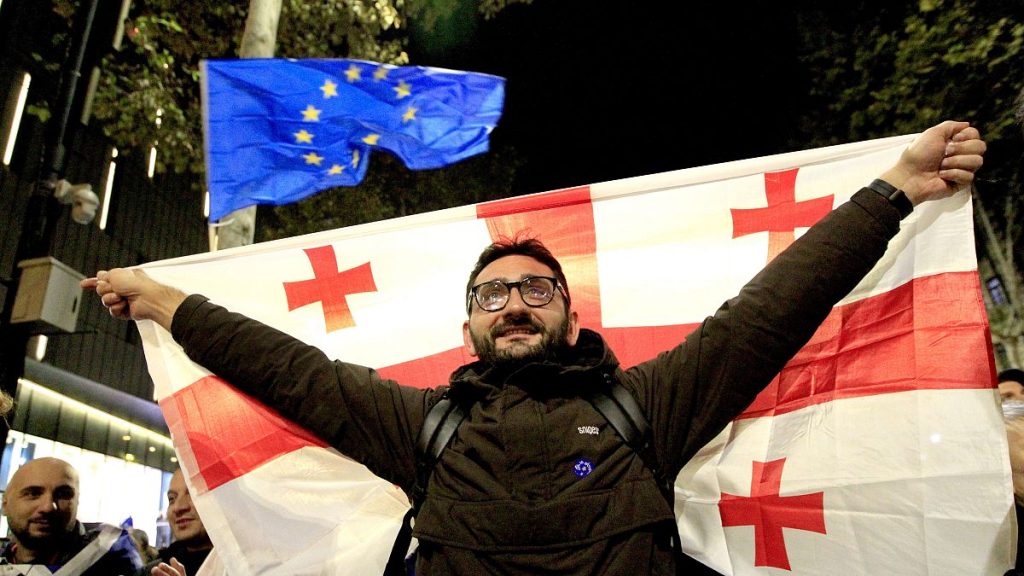Tens of thousands of Georgians recently took to the streets of Tbilisi in a show of support for their country’s bid to join the European Union. This rally occurred just one week before parliamentary elections set to take place on October 26, which many view as a critical moment to determine Georgia’s stance towards Russia and Europe. Protesters gathered under a banner of unity for Georgia’s European future, denouncing the current government’s alleged undermining of this path. Last year, the EU granted Georgia candidate country status, but opposition supporters claim that the ruling Georgian Dream party has hindered the country’s chances of EU accession.
Two controversial pieces of legislation have sparked criticism and tension within Georgia. The first, an anti-LGBTQ+ rights bill signed into law earlier this month, includes bans on same-sex marriages, adoptions by same-sex couples, and limitations on LGBTQ+ couple depictions in media. It also prohibits gender-affirming care and gender designation changes in official documents, sparking concerns about discrimination and anti-LGBTQ+ hate crimes. The second piece of legislation, passed in May, is a foreign agent law requiring media organizations and NGOs to register as foreign agents if they receive a significant portion of their funds from abroad. This move, dubbed the “transparency law” by Georgian authorities, has drawn criticism for mirroring similar oppressive legislation enacted by the Russian government.
President Salome Zourabichvili, who is pro-European, has refused to endorse both controversial laws proposed by the Georgian Dream party. She has expressed a strong commitment to Georgia’s European future and has criticized the government’s actions that have led to the freezing of the country’s EU accession process. Many Georgians fear that their country is moving closer to Russia’s influence after decades of independence following the Soviet Union’s collapse. The ongoing political tensions and debates surrounding Georgia’s path towards Europe or Russia are exacerbating divisions within the country, particularly as the parliamentary elections draw near.
The rally in Tbilisi served as a platform for Georgians to express their desire for a European future and to voice their concerns about the current government’s policies. The event drew together individuals from various political affiliations united by a shared vision of Georgia aligning with Europe. Despite the challenges facing the country and the uncertainty surrounding its geopolitical direction, the protesters at the rally displayed a strong sense of unity and determination. The upcoming parliamentary elections will play a crucial role in shaping Georgia’s trajectory and its relationship with Russia and Europe, with the ruling Georgian Dream party currently leading in opinion polls.
The Georgian Dream party’s contentious legislation and perceived alignment with Russia have sparked widespread criticism and backlash, not only within Georgia but also from international partners like the European Union. The EU’s concerns over human rights violations, anti-LGBTQ+ laws, and restrictions on media and NGOs have led to a halt in Georgia’s EU accession process. President Zourabichvili’s refusal to endorse the controversial laws highlights the internal divisions and political tensions within Georgia. The upcoming parliamentary elections are viewed as a pivotal moment for the country, with the results likely to have far-reaching consequences for Georgia’s future trajectory and relationship with Europe and Russia.
As Georgia stands at a crossroads between its pro-European aspirations and the pressures exerted by Russia, the unity and determination of the pro-EU protesters in Tbilisi signal a strong desire for a European future. The political landscape in Georgia is fraught with tensions and divisions, exacerbated by the ruling party’s controversial legislation and perceived alignment with Moscow. The upcoming parliamentary elections will serve as a critical juncture in determining the country’s path forward, with Georgians poised to make a decision that will shape their relationship with Europe and Russia for years to come. The rally in Tbilisi encapsulates the hopes and fears of many Georgians, who are seeking to chart a course that aligns with their aspirations for a democratic and European future.


